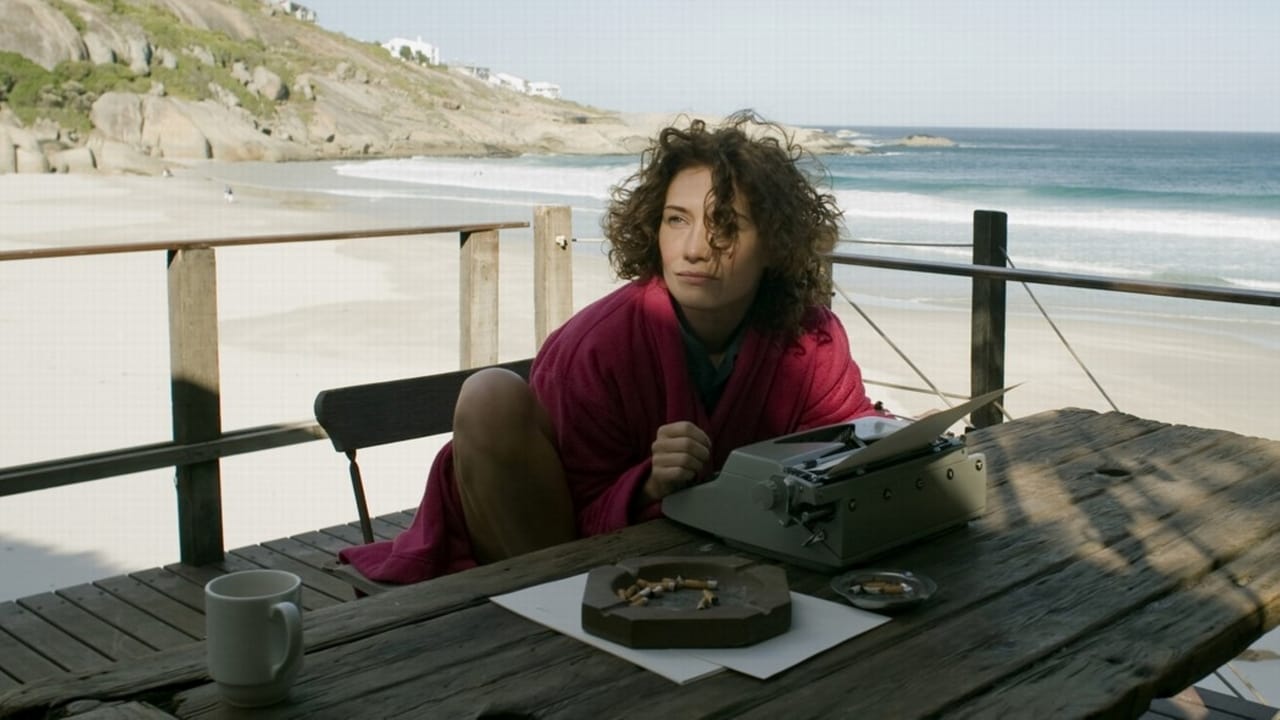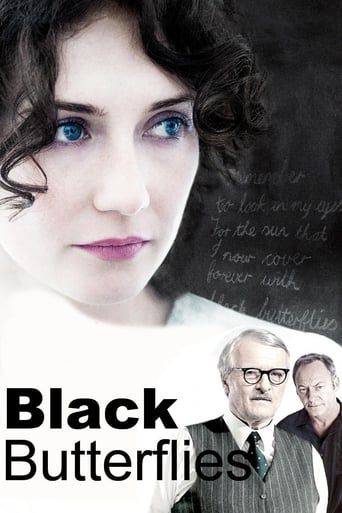Colibel
Terrible acting, screenplay and direction.
SoftInloveRox
Horrible, fascist and poorly acted
Kayden
This is a dark and sometimes deeply uncomfortable drama
Jenni Devyn
Worth seeing just to witness how winsome it is.
SnoopyStyle
After the death of their grandmother, young Ingrid Jonker (Carice van Houten) and her sister Anna were given to their estranged father Abraham (Rutger Hauer). He is an overbearing father and becomes the minister of censorship. She has a baby and can't get rid of her clingy husband. One day, she's rescued by writer Jack Cope (Liam Cunningham) and they begin a stormy affair.Maybe there is a compelling story in this person's bio. They didn't find it in this movie. Director Paula van der Oest has put in a lot of poetry and made a boring melodrama. The story has no excitement. Rutger Hauer plays domineering father well but he lacks menace and screen time. Ingrid Jonker's life is a mess and that's really all I got out of the movie.
stephanlinsenhoff
The undeniable fact: we are born by parents. To be an individual: our responsible is to discard the parental form and replace our own. What we want to be and are. Guided by our very own ideas as model. Few reach this goal. A copy of what should be discarded. Not many manage and resume as copy their life. Among the not many is the life of Karin Jonkers. The fathers denial of his daughter, himself not only a writer but also a politician, made public in his speech his denial. The ultimate proof that both are individuals. Upright.Accepting the consequences. In public for all those cowards who choose the broad side of life. Like this his comment of her suicide has to be not only looked at but seen, reportedly he said: "They can throw her back in the sea for all I care." We have to, must as child of our parents discard the form we received at birth. By birth she was destined upper-class. Many are, growing up, revolutionary, sinking back into the comfortable frame of life. Even she. As it seemed. But consequently her loyalty was her own, focused on the South African questions many looked at, denying to see. Not caring what whoever told her to do: her divorced husband her lovers, her friend Jack Cope, himself a writer who always was there when needed. Nelson Mandela read her poem, "Die kind (wat doodgeskiet is deur soldate by Nyanga)" ("The child (who was shot dead by soldiers at Nyanga)"), in Afrikaans, during his address at the opening of the first democratically elected parliament on 24 May 1994.Ingrid Jonkers was homeless and in need of love. Apartheid, her father responsible for censorship was her enemy. Neither Jack Cope and Andre Brink helped or could help. She had to manage it alone. She was loved and loved but homeless. As it happened with the New Zealands poet and writer Janet Frame, also Ingrid Jonkers was periodical in a mental hospital: sent by her father! ... She and a few others home is the fringe of, what generally is called madness. But here, as society's fools, poetry and real life is the only true possibility. She is sane and insane. Not either-or but proofs that both is possible - as long as everything is given and nothing to loose and be taken.
gradyharp
BLACK BUTTERFLIES is a biographical drama based on the life of Ingrid Jonker. For those who are unfamiliar with this poet the following description my aid in the appreciation of this film: 'Ingrid Jonker (19 September 1933 - 19 July 1965) was a South African poet. Although she wrote in Afrikaans, her poems have been widely translated into other languages. Ingrid Jonker has reached iconic status in South Africa and is often called the South African Sylvia Plath, owing to the intensity of her work and the tragic course of her turbulent life. Her work has also been compared to that of Anne Sexton.' Greg Latter has written the screenplay that attempts to give us all the facets of this enigmatic personality and the film is directed by Paula van der Oest. It is obviously an act of love.We meet Ingrid and her sister Anna as children, poor, without shoes, and taken to the home of their Apartheid father Abraham Jonker (Rutger Hauer) the Minister of Censorship for the parliament of South Africa. As Ingrid (Carice van Houten) matures she becomes a beautiful, but impetuous young poet, feeling abandoned, blaming others, promiscuous, escaping in excessive drinking too much in order to feel safe and able to cope, and becoming overwhelmed by conflicting emotions, which characterize some common personality disorders. At her father's demand she married Pieter, has a daughter by him, and leaves him because she feels trapped. While swimming in the ocean she nearly drowns but is saved by writer Jack Cope (Liam Cunningham) - this act results in a love relationship and despite Jack's decaying marriage they plan to live together. They both support the young South African poet Nkos (Thamsanqua Mbongo) and aid his escape form South Africa to Europe in hopes of finding freedom to write. Ingrid's and Jack's relationship is passionate and stormy: Ingrid has affairs simply because she has the freedom of mind to do so, and the affair with one Eugene Maritz (Nicholas Pauling), a married man, drives Jack away. Ingrid aborts the child she conceived with Jack (Jack does not know this) and eventually does the same with a child conceived with Eugene. All the while Ingrid is suffering form her inner demons but at the same time becoming more aware of the cruelty of Apartheid. Her writings reflect these feelings and are censored by her father. Yet her greatest collection of poems about the Apartheid are published despite her father's wishes and her father disowns her for being a wasted 'slut.' Ingrid's increasingly bizarre behavior results in several psychiatric hospitalizations and suicide attempts and she goes to Paris where she is treated with electroconvulsive therapy. The treatment calms her but robs her of the ability to write poetry and during the night of 19 July 1965, Jonker went to the beach at Three Anchor Bay in Cape Town where she walked into the sea and committed suicide by drowning.Carice van Houten, Liam Cunningham, and Rutger Hauer offer brilliant performances and the support cast is strong - Candice D'Arcy as Ingrid's sister Anna, Grant Swanby as Jan Rabie, and Graham Clarke as Jack's closest mate Uys Krige. During the film's credits we hear Nelson Mandela reading Ingrid's prize winning poem 'The Dead Child of Nyanga', probably the most important poem to influence the end of Apartheid.She searched for a home, she searched for love. Confronted by Apartheid and a father who was Minister of censorship. With men like Jack Cope and Andre Brink she found much love, but no home. In his first speech to the South African Parliament Nelson Mandela read her poem "The Dead Child of Nyanga" and addresses her as one of the finest poets of South Africa. The child is not dead The child lifts his fists against his mother Who shouts Afrika ! shouts the breath Of freedom and the veld In the locations of the cordoned heartThe child lifts his fists against his father in the march of the generations who shouts Afrika ! shout the breath of righteousness and blood i n the streets of his embattled prideThe child is not dead not at Langa nor at Nyanga not at Orlando nor at Sharpeville nor at the police station at Philippi where he lies with a bullet through his brainThe child is the dark shadow of the soldiers on guard with rifles Saracens and batons the child is present at all assemblies and law-givings the child peers through the windows of houses and into the hearts of mothers this child who just wanted to play in the sun at Nyanga is everywhere the child grown to a man treks through all Africathe child grown into a giant journeys through the whole world Without a passThis is a courageous and deeply moving film about a great poet. Grady Harp, April 12
amalgam-3
A middle aged writer rescues a young woman from drowning near the shores of South Africa. Although he is much older, they fall in love right there and then and soon some obvious complications ensue. There is hardly a likable or interesting character in this wandering historical drama about the poet Ingrid Jonker (Carice van Houten). It deals primarily with the mentally troubled writer and her precarious relationships with men, including her father (Rutger Hauer) who is a member of the apartheid regime she strongly opposes. The film never picks up any speed and the absence of a discernible plot line or a compelling narrative makes for a very pallid viewing experience. Hauers script is particularly one-note but the same could be said of van Houten who seemed to be out of her depth in the role of a frustrated and depressed young woman trying to get her voice heard through rebellious poetry. Liam Cunningham fares a lot better as one of the two love interests and produces the only sympathetic character of the film.

